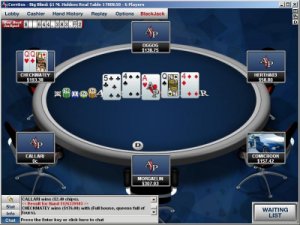bwin.party Settles with Kentucky, Forks Over $15 Million

 According to Business First and other media outlets, the European-based online gambling company bwin.party has settled with the Commonwealth of Kentucky in a civil suit that was filed in 2010. The price: $15 million, which covered losses from Kentucky residents on PartyPoker. It is the second internet gambling payment to the Commonwealth in the last week, as in late June, Kentucky reached a $6 million settlement with the U.S. Government over the Absolute Poker and UltimateBet domain names.
According to Business First and other media outlets, the European-based online gambling company bwin.party has settled with the Commonwealth of Kentucky in a civil suit that was filed in 2010. The price: $15 million, which covered losses from Kentucky residents on PartyPoker. It is the second internet gambling payment to the Commonwealth in the last week, as in late June, Kentucky reached a $6 million settlement with the U.S. Government over the Absolute Poker and UltimateBet domain names.
—
InterPokerhas been securely dealing cards since 2002. The recently re-launched site offers a wide array of promotionslike $10 cash free for new players as well as a 25K race for SnG players. WSOP qualifiers are also running now. Check out the new and improved InterPoker.
—
Business First quotes Kentucky Governor Steve Beshear as saying, “I’m pleased that we were able to recover losses on behalf of Kentuckians. bwin.party is making every effort to comply with the laws of the United States and demonstrate that they want to be known for their integrity and honesty in this industry.” According to Lexington’s NBC affiliate, “Justice and Public Safety Cabinet spokeswoman Jennifer Brislin said the money will go into the state’s General Fund.”
In 2006, PartyPoker vacated the U.S. market following the passage of the Unlawful Internet Gambling Enforcement Act, or UIGEA. At the time, PartyPoker was the largest online poker room on the face of the Earth and was promoting its Monster series. The lawsuit in question stems from bets taken before the UIGEA was signed into law in late 2006 and was filed three years ago.
Originally, Kentucky’s 2010 complaint singled out Pocket Kings, the former owners of Full Tilt Poker. That lawsuit was filed in March 2010 and covered the period between March 2005 and September 2009. In August 2010, the complaint was amended to include Party Gaming, which was fresh off announcing a merger with rival bwin.
 At the time, Interactive Media Entertainment and Gaming Association (iMEGA) Chairman Joe Brennan (pictured) told Poker News Daily that the amended complaint was nothing more than a money grab: “This is a last minute ploy by the Commonwealth to try to force a settlement. I think they named Party because the company is engaged in a merger and they’re trying to use that to get money out of them. They’re probably trying to get Party to pay out some cash settlement. Party has been around for a while and nothing has changed other than they’re trying to undergo a merger.”
At the time, Interactive Media Entertainment and Gaming Association (iMEGA) Chairman Joe Brennan (pictured) told Poker News Daily that the amended complaint was nothing more than a money grab: “This is a last minute ploy by the Commonwealth to try to force a settlement. I think they named Party because the company is engaged in a merger and they’re trying to use that to get money out of them. They’re probably trying to get Party to pay out some cash settlement. Party has been around for a while and nothing has changed other than they’re trying to undergo a merger.”
In 2009, one year before the amended complaint from the Commonwealth of Kentucky came out, Party Gaming signed a non-prosecution agreement with the U.S. Government and agreed to hand over $105 million. As part of the agreement, the company conceded, “From 1997 until 13 October 2006, PartyGaming offered internet gaming to players located in the U.S., including real-money poker and casino gaming. On 13 October 2006, the day the UIGEA was enacted, the Group voluntarily exited the U.S. market.”
Now, PartyPoker is the fourth largest network worldwide, according to the traffic watchdog site PokerScout, and has a seven-day running average of 2,050 real money ring game players with a 24-hour peak of 2,365. It sits in a virtual deadlock with 888 Poker in terms of cash game traffic.
 Late last month, Kentucky dropped its seizure claim against Absolute Poker and UltimateBetin exchange for $6 million from the Federal Government. The Commonwealth also banked $75,000 as part of an auction of truepoker.com, doylesroom.com, and bookmaker.com. It still has lawsuits pending against PokerStars and Full Tilt Poker and filed largely unresolved seizure claims in 2008 against 141 internet gambling domain names.
Late last month, Kentucky dropped its seizure claim against Absolute Poker and UltimateBetin exchange for $6 million from the Federal Government. The Commonwealth also banked $75,000 as part of an auction of truepoker.com, doylesroom.com, and bookmaker.com. It still has lawsuits pending against PokerStars and Full Tilt Poker and filed largely unresolved seizure claims in 2008 against 141 internet gambling domain names.
A bwin.party representative told Pokerfuse that the company can offer online gambling in the Commonwealth down the road and that an important milestone had been reached in its pre-UIGEA litigation: “The agreement resolves the only remaining litigation involving the Company that stems from our pre-UIGEA U.S. activities. The agreement also makes it clear that it does not prevent or limit bwin.party from offering internet gaming to Kentucky residents in the future, if lawful and licensed there.”
Keep it tuned to PocketFives for the latest poker legislation news.
Want the latest poker headlines and interviews? Follow PocketFives on Twitterand Like PocketFives on Facebook. You can also subscribe to our RSS feed.




